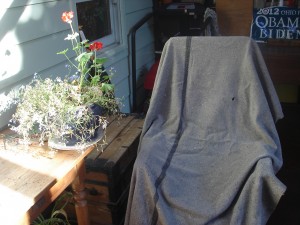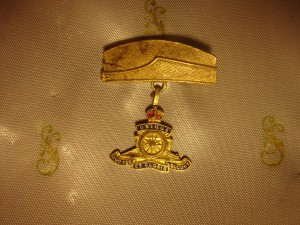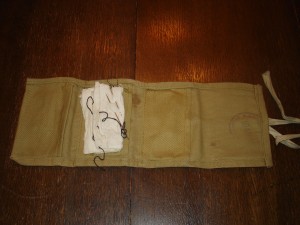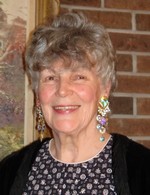Pat Irwin Lycett is a former creative writing student of mine. In fact, she participated in one of my first memoir writing workshop series for North York Central Library, seven years ago, and has followed my website and kept in touch. Her beautiful Seven Treasures post below ventures a little beyond the series’ usual form — but you’ll see why I want share it with you.
♦ ♦ ♦
 This morning I hung my father’s Second World War army blanket on the line to air. During the winter it sits on the veranda in an old trunk filled with grandkids’ toys. A few days from now, for our outdoor family party, it will be attached to a tree with clothes pegs, enclosing a See-Your-Future booth, courtesy granddaughters Cassie, Emma, and Keara.
This morning I hung my father’s Second World War army blanket on the line to air. During the winter it sits on the veranda in an old trunk filled with grandkids’ toys. A few days from now, for our outdoor family party, it will be attached to a tree with clothes pegs, enclosing a See-Your-Future booth, courtesy granddaughters Cassie, Emma, and Keara.
It’s made of harsh, sturdy fabric, iron-grey with black stitching. I send a silent word of thanks to our Canadian Government for providing this amenity, hoping it gave some warmth to my poor father, in France or Holland, in those days of long ago. One wonders where they bedded down, young and old (my dad well over 40), so far from home. In the movies, fortunate soldiers found a barn, breathed in the warmth of living animals, or sliced into a vein to suck out mineral-rich blood, hoping the animal was healthy.
“This is Lowell Thomas with the news at six,” blared the radio, as I climbed onto my grandfather’s knee to be updated on the latest atrocities of the war, dimly aware that my father was over there, somewhere, keeping those bombs from our house. We sat together in Grampa’s old wicker rocker (now a fixture in our home, eyed by my son Matt and his son, Alex), heads wreathed in smoke from his pipe, a shared and comforting experience for a four-year-old. Grampa struck a match on the right rocker, the worn spot visible to this day, and I got to blow it out.
 Other tokens come to mind. Still in my mother’s jewellery box, packed in a bottom drawer, are small buttons from his uniform, and the pin from his breastpocket with attached tiny cap, a replica of the one tucked into his epaulette. In the last picture taken before he left for overseas, he’s in full uniform, cap in place.
Other tokens come to mind. Still in my mother’s jewellery box, packed in a bottom drawer, are small buttons from his uniform, and the pin from his breastpocket with attached tiny cap, a replica of the one tucked into his epaulette. In the last picture taken before he left for overseas, he’s in full uniform, cap in place.
I recently unearthed a small khaki sewing kit, about a foot long and three to four inches wide. Made of strong cotton, it’s divided into three pockets that fold up and tie with the attached heavy string — a small flat bundle assigned to soldiers, part of their army gear. We used to call it “kharki” when I was a kid — don’t know where the r came from, but I remember it clearly.
 The kit contains one very large needle, and one much smaller for reattaching buttons, still threaded with dark grey. The needles are woven into white patches of flannel, folded over. A strand of thicker thread lies across. A large circle stamped on the closing flap has lost its print over time, but still holds the word Ottawa, and the date — 1940 — the year I turned three. On the outside, the number B28976, issued to him when he joined up, remains very clear.
The kit contains one very large needle, and one much smaller for reattaching buttons, still threaded with dark grey. The needles are woven into white patches of flannel, folded over. A strand of thicker thread lies across. A large circle stamped on the closing flap has lost its print over time, but still holds the word Ottawa, and the date — 1940 — the year I turned three. On the outside, the number B28976, issued to him when he joined up, remains very clear.
I’d seen this little kit before, somewhere in my past, and it surfaced again lodged beneath Mother’s recently discovered family history. I’d never checked beyond the needles, thought the three pouches were empty, until I had a better look this morning. Searching through the pockets — strange that I hadn’t done this before — I find a small advertisement, showing purple diagrams on a buff-coloured background. It purports to interest the reader in solder repair, inviting him to “Write Today for Free Sample and the Method.”
I can imagine my mother, concerned for his return to civilian life and about the availability of jobs, offering suggestions by mail. Sitting at Gramma’s little oak desk (mother and I still living with her parents), she may have written, Jim, perhaps you could get interested in car repairs as a line of work. More and more people will be buying one. And his possible reply — negative and disgruntled, beaten down by life and the war — I don’t think so. Anyway, not many people will be able to afford cars.
On his return in 1946 he became a postman, a job open to many vets. I don’t remember his ever looking really happy. I do remember his stifled tears on the death of our little dog. My father had spent many formative years in a Catholic orphanage, and I realize now that Brownie was likely the only dog he was ever allowed to own.
In the early ′50s Mother asked him to leave, concerned about his losing his job and worried that his gambling debts would cut into her hard-earned nursing income. We never really saw him again. We learned in the mid-′60s that he died in an institution, thirty miles from our home.
Life buried my father way before his time. Who knows, had things been different he might have lucked into a thriving business, “repairing cracked cylinder heads,” right there in our hometown.
I fold the little buff-coloured paper and put it back in his sturdy sewing kit, which now sits, intact, near my desk.
♦ ♦ ♦
 PAT IRWIN LYCETT is a retired nurse, real estate broker, nutritionist, iridologist, tai chi teacher, and owner of a book and crystal store. She has 7 children and 20 (and counting) grandchildren. She is author of the blog helpingyourselftohealth.wordpress.com, and is writing a loose collection of family memories from 1892 to the present.
PAT IRWIN LYCETT is a retired nurse, real estate broker, nutritionist, iridologist, tai chi teacher, and owner of a book and crystal store. She has 7 children and 20 (and counting) grandchildren. She is author of the blog helpingyourselftohealth.wordpress.com, and is writing a loose collection of family memories from 1892 to the present.
This is beautiful … and sad!
Sad but beautifully told.
Thank you.
As to “kharki” — I’m reminded of a school chum whose mother came from Blackpool, England. She said “kharki” and threw “r”s into a lot of other words as well, and insisted that this was the right way to pronounce them, as she ought to know, because her mother was English!
Thank you, Barbara for your kind comments. Yes, I expect the kharki derivation must have
been British. Thanks for responding. xoxoxo Pat
What a lovely and poignant story – it likely tells the story of many men returning from the war, unsure, unhappy, scared and not knowing how to move on. A sad but instructional legacy beautifully written.
Hello, Allison. Yes, even today, one hears of the devastation occurring in the lives of many (usually men) returning from active duty. We weren’t the only ones suffering, although I felt like the only person I knew, in high school, who was living through that difficulty. Life, eh? How often we seem to have little control over what happens to us. I guess that’s why we all try to make it fair for the people we care most about. Thank you, oxoxox Pat
Pat, it’s odd how we hold on to the things that came before us from our parents. This link with your father is special to you. Knowing how his life ended, he must have suffered from his experiences. I loved your closeness with your family. I can see that little girl blowing out the lit match (as I was invited to do many times as a child).
Yes, Mary, I so often wish that I had clued into his living in Hamilton. Would have been so easy to make contact. Just never occurred to me. I might have been able to make his lonely life less lonely. Thanks for writing. xooxox Pat
I have known Pat for many years, and worked with her for a few years.
She is one of the ’10 Women in My Life I Could Not Do Without’!
Her story is beautifully told, she learned her writing skills well.
I knew some of these ‘7 Treasures’, but so well told in this that I was with her on her
grampa’s knee
Thank you for giving us a chance to read this.
Thank you, Kellie dear, for your very kind words. I love you, too. xooxoxox Pat
I’ve known Pat, ( my spiritual godmother ) for a number of years, sharing our writing exercises and honing our skills as part of the group – ‘Writing is hard work.’ I’m familiar with the genesis of this her most touching memoir, and am delighted to see its fulfillment.
Her writing is not only personal but historical and informative. She allows us a peek into the dreadful war years as it impacted on the average Canadian, far from the glorification of war Hollywood depicted. Like others, I was also a child sitting on her grandfather’s knee lost in the sweet aroma of his pipe smoking. I shared the despair of ‘daddy’ coming home a different man from that of my childhood memory, and the loss again of daddy to time and circumstances. Thanks Pat, hugs and kisses for letting us into your fascinating world.
Thank you, Ray dear. I so well remember our classes together, and your developing skills as a travel writer. Thanks so much for your kind comments. And keep up YOUR good work. xooxoxo Pat
Pat, this version of your memories is infused with such thoughtful sincerity. Your words are so well chosen. When I was a kid, I also used to be fascinated by my great uncle’s identical army-issued — in Ottawa — kha(r)ki sewing kit. I never knew Uncle Lorn (he was killed during WWII), but that sewing kit of his was one small material object that made all the family stories about him take on extra tangibility for me. Thanks for sparking that recollection in me.
Dear Morgan: I missed your message, but am now enthralled by it. thankyou so much for sending. yours truly, pat.